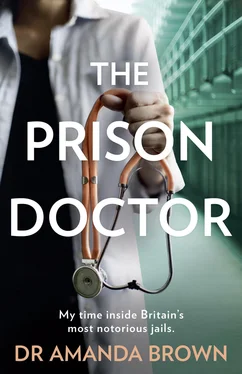Two prison officers would be needed to escort her to hospital, with one officer cuffed to the prisoner, just in case she tried to make a run for it. I didn’t think I’d ever get over the sight of that, however much I knew it was necessary. I’d been taught that no prisoner is ever too sick to make a dash for freedom. The story of a new mum who jumped from the first floor window of a hospital maternity ward still does the rounds.
One of the paramedics turned to me, opening her arms: it was time to hand over the baby.
I gave the little girl one last cuddle, gently stroking her cheek with my forefinger. She wrapped her whole hand around my little finger and I said a little prayer in my head, hoping for the best.
If she was allowed to stay with her mum they would be located on the Mother and Baby Unit, on return from hospital, for a maximum of eighteen months. If the mother’s sentence was longer, the child would then be taken into care. However, if it was decided the mother wasn’t fit to care for her baby they would be separated very soon after birth.
Being a mother myself, I can’t imagine what it must feel like to have your baby taken from you. To spend the days and nights in prison, imagining how she is growing up, what she looks like, who is taking care of her when she cries.
What would happen to the baby? I could look into it, of course. I could ask. I could follow the case through. But could I bear to know?
My contribution to the prisoners’ lives is limited. I can’t rewrite history for them, but I can take the edge off their suffering. I can help wean them off their addictions. I can be a listening ear.
My job is not to judge them but to care for them, and helping people, regardless of who they are and what they have done, is what I live for.
Everyone filed out and I was left alone, staring at the stained walls, the bloodied footprints. The claustrophobic grimness of the cell.
‘You all right, Doc?’ Becky asked.
‘Yes, mate,’ I sighed.
I followed her back downstairs and threw on my armour. It wasn’t just the prisoners who needed to be strong to survive being in there. If I took everything I saw to heart, I’d be a mess.
I had a job to do – other people were waiting for me.
PART ONE
Where It All Began
2004–2009
Chapter One
HMP Bronzefield
2019
‘Wait up, Doc!’ I spotted Gary, a prison officer, running towards me.
Many of the gates in the prison are alarmed, and staff have about thirty seconds to lock them before the sirens start blaring. I held the gate open. He weaved himself through in the nick of time.
I pulled the heavy gate shut, the resounding clang ringing through our ears. I locked it with one of the five keys chained to my black leather prison-issue belt. I knew which key I needed without looking; I’ve locked and unlocked those gates so many times.
We were in the central atrium at HMP Bronzefield. The largest female prison in Europe. Home to seventeen out of the twenty most dangerous women in the UK. Some high-profile murderers have been locked up here. Serial killer Joanna Dennehy, Becky Watts’s killer Shauna Hoare, Mairead Philpott who helped start a fire that killed six of her children. Then there was Rosemary West, of course, also once a prisoner there – or ‘resident’ as they are referred to in Bronzefield.
The atrium roof is surrounded by windows; daylight, bright and beautiful, 60 feet above your head. In the middle of the room, five very tall synthetic trees reach towards the light. Even the plastic trees are trying to get out of there. It’s bright and airy, a far cry from the tiny cells where the prisoners spend so much of their time.
‘You’re looking tanned!’ I told him.
Gary grinned at the memory of his week of freedom.
‘Seven days and six nights in Spain. All inclusive, the missus loved it. I didn’t want to come back!’
But I knew that wouldn’t be quite true. The shifts can be long and exhausting, physically and emotionally, but for some reason we do still want to turn up for work. And it’s not just because it pays the bills.
It gets into your bones. The drama, the camaraderie, the highs and lows. I can honestly say I would rather spend a Friday evening working in Reception – meeting prisoners arriving from court, a diverse range of people, from different backgrounds, different cultures – than be out socialising.
But then, I’m not very good at small talk any more.
After hearing the sorts of stories I have over the years, I find it hard to engage in social chit-chat. I find it hard to talk about things that are trivial. You’d think I’d relish the break, the relief from the seriousness, but I don’t think of it like that. Every day I’m part of something important. I think of it as an honour, a privilege, that people, often from completely different worlds from mine, will choose to confide in me and relate to me.
I don’t know if it was his break away from the place, but Gary was in a philosophical mood. As we walked towards the gates which lead on to the Healthcare unit, our keys jangling with every footstep, he turned to me and said, ‘You know what, Doc, I’ve been thinking.’
‘Uh oh!’ I teased him.
He flashed me a smile and then suddenly looked serious.
‘I’ve been thinking about life. This place, and why people end up here.’
I was intrigued. ‘Go on.’
Gary had been at HMP Bronzefield for fourteen years and was one of the good guys. He liked the challenge of dealing with the emotional needs of prisoners; he wanted to see them reformed.
He frowned, thinking for a moment. ‘I think most prisoners have had a Sliding Doors moment,’ he said. ‘You know, that point in life where your life could really go either of two ways.’
I stood back while he opened the next set of gates. Like me, his fingers found the right key without ever having to look.
We made our way into the medical suite, a selection of rooms off a narrow corridor. I waved hello to Soheila in the pharmacy.
‘It could happen to anyone, couldn’t it?’ he continued. ‘A moment, a random moment when your whole life hangs in the balance. Like . . .’ He tried to think of an example.
‘You’re having a drink in a pub, a fight breaks out, you hit someone, that person falls back and smacks their head. They die. The next thing you know, you’re banged up inside for manslaughter.
‘Your life can change in the blink of an eye. You know what I mean, Doc?’
Of course I knew. After all, it was just such a moment that had led to me being there.
Buckinghamshire
2004
The warmth of the central heating blasted into my face as I walked through the entrance doors of my GP practice.
I was greeted with a smile from Kirsty on reception.
‘Morning, Amanda!’
I had no idea how she managed to be so cheerful, so early in the day.
As usual I felt daunted at the thought of how many patients I was likely to be seeing that day, but I loved my job as a GP – however exhausting it was.
I tugged my gloves off with my teeth, and picked up a pile of letters and notes Kirsty had put aside for me. So much paperwork.
‘How’s today looking?’ I asked.
‘Fully booked. Biscuit?’ Kirsty waved the packet under my nose.
I shook my head. ‘Don’t forget the lunchtime meeting.’
‘All scheduled, she said, tapping at the calendar on her computer screen with her biscuit.
My stomach somersaulted thinking of the meeting, and the changes it might bring to my cosy practice.
In less than a month, on 1 April 2004, the new GP contract would be introduced, in which the whole pay structure for general practice would change. The basic pay would be reduced, but bonus payments could be earned if certain questions were asked and checks were done during the consultation.
Читать дальше












